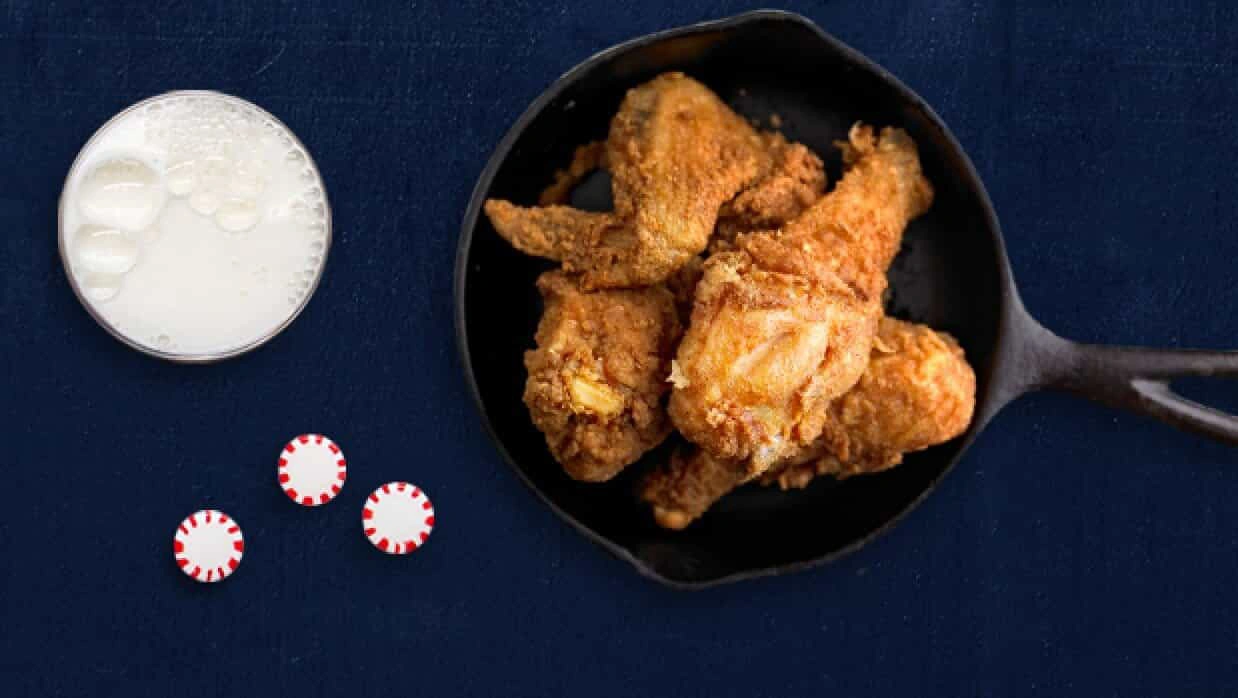When you swallow, food travels down your esophagus, past a ring of muscle and into your stomach. But sometimes, that ring of muscle doesn’t work as it should – and stomach acid or partially digested food can leak back out1. This is known as “acid reflux”, and can result in mild discomfort. Persistent cases may also be a sign of the condition GERD1.
If you regularly experience acid reflux, you may notice that some foods can increase the chances of it happening. You might have also heard one of the many food myths related to acid reflux and heartburn too.
How your food affects your stomach is often personal, and what affects one person might not affect another. However, there are many common trigger foods, and modifying your diet may help you manage acid reflux.
If you’re looking into acid reflux dietary modifications, you’ve come to the right place! Below, you’ll find suggestions for what to drink for acid reflux, as well as foods that may help with your acid reflux too.
List of Foods To Eat With Acid Reflux
Vegetables
Foods that are high in fat can take longer to digest in your stomach, increasing the chances of acid reflux2. Vegetables, by contrast, are naturally low in fat – and can be digested quicker compared to other foods3. If you want to reduce acid reflux, consider modifying your diet to include:
Broccoli
Carrots
Cauliflower
Green beans
Leafy greens
Peas
Oatmeal
Oats are a grain that absorb stomach acid, which can help reduce the chances of acid reflux in the first place4. They’re also high in fiber, which is often associated with a lower incidence of acid reflux5. Try eating them as oatmeal, and introduce your own toppings for added flavor.
Chicken, Fish, and Other Lean Meat
Much like vegetables, chicken, seafood, and other lean meats are low in fat. This lower fat content means they take less time to digest, and are less likely to result in acid reflux2.
That said, it’s also important to consider how you cook or prepare your food. For example, while fish is typically low in fat, frying it in oil will only raise its fat content. Similarly, if you’re concerned about acid reflux, think about the rest of the food on your plate. Chicken with steamed vegetables is less likely to trigger acid reflux than a chicken pizza, for example.
You may therefore want to cook fish and lean meats by grilling, broiling, poaching, or baking.
Egg Whites
Egg whites are naturally high in protein and contain little fat, whereas egg yolks are higher in fat and have the potential to trigger acid reflux.
Poaching your eggs can be better for your acid reflux than frying them4.
Bananas, Watermelon, and Other Non-Acidic Fruits
Acid reflux can, perhaps unsurprisingly, be impacted by eating acidic foods. Some of the most acidic are fruits, especially those from the citrus family4.
Instead of eating things like pineapple, grapefruit, or oranges, try to focus on softer, sweeter fruits such as:
Melons
Pears
Apples
Bananas
Grapes
Low Fat Yogurt
Many people wonder if yogurt is good for acid reflux, but whole fat yogurt can be hard to digest. Instead, consider replacing it with low fat yogurt, or yogurt that is not too sour. This small dietary modification may help make acid reflux more manageable in some cases, due to its help in maintaining intestinal barrier integrity4.
Potatoes
Potatoes, like vegetables, are low in fat and sugar which means they’re easy to digest and may therefore help limit the risks of acid reflux.
Again, it’s important to consider how you prepare your potatoes. Fries will likely have more fat than boiled or baked potatoes, for example, so you may want to bear this in mind.
Rice
Brown rice is a complex carb that is full of fiber, and less likely to aggravate your acid reflux than white rice4. Avoid frying it if you’re worried about worsening your symptoms.
What To Drink for Acid Reflux
Ginger Tea
Taking certain types of tea for acid reflux can be helpful. Ginger, for example, has long been used to soothe stomach aches, indigestion, and nausea.
With natural anti-inflammatory properties4, ginger can be easily steeped in hot water to create ginger tea, or added to smoothies.
One of the key benefits of ginger is that it promotes digestion and encourages food to move past the stomach and into the gastrointestinal tract4. You should be aware, however, that it can trigger heartburn in some people, so if you’re unused to ginger first try it in small doses4.
Herbal Tea
Many herbal teas, including chamomile, ginger, and turmeric, have anti-inflammatory properties. They’re normally free of caffeine and are a good way of ensuring you drink enough water.
You should be aware that some herbal teas will be blends, which means they contain several ingredients. Some, such as mint, may trigger acid reflux4, so be sure to check what’s in your herbal tea.
Plant-Based Milk
Does milk help with acid reflux? No – and that’s actually a common myth. Indeed, if you have a lactose intolerance, you might experience the opposite6. Dairy products can sometimes contain high levels of fat, which can trigger reflux and associated symptoms.
If you find cow’s milk is causing you problems, however, one dietary modification that can help would be switching to plant-based milk. This might be oat, almond, soy, or pea milks. If lactose is causing the issue, you could also switch to lactose-free milk.
Non-Acidic Juices or Smoothies
We’ve already talked about how acidic fruits can contribute to acid reflux, given their naturally sour flavors. This applies to juice and smoothies too.
While you might enjoy a glass of OJ with breakfast, if you struggle with reflux, you may find even apple or mango juice can cause issues. However, the less acidic a drink is, the less chance of a stomach upset. So, consider trying some low acid alternatives. Papaya juice, for example, can support healthy digestion and help reduce symptoms of GERD4.
Does Water Help Acid Reflux?
Drinking sufficient water can slightly neutralize the pH level of your stomach. But the primary benefit is helping food move from your stomach into your gastrointestinal tract and small intestine7.
Some studies have also found that drinking slightly alkaline water, rather than conventional water, may help8.
If you are finding that dietary changes are not helping your acid reflux and heartburn, you may want to consider taking over the counter medications, or speaking to your doctor.
Reduce Acid Indigestion and Heartburn With PEPCID® for Acid Reflux
Acid reflux is closely tied to acid indigestion and heartburn. The symptoms may vary and can be very uncomfortable, but the cause is the same.
All three are a result of stomach acid rising up into the esophagus or leaking out of the stomach1. Fortunately, over-the-counter products can help alleviate symptoms, and make heartburn and acid reflux much more manageable.
PEPCID COMPLETE® contains an H2 blocker called famotidine that helps curb acid production, while calcium carbonate and magnesium hydroxide help to neutralize existing acid. It’s fast acting and readily available from most pharmacies, coming in the form of a chewable tablet for added ease and convenience.




